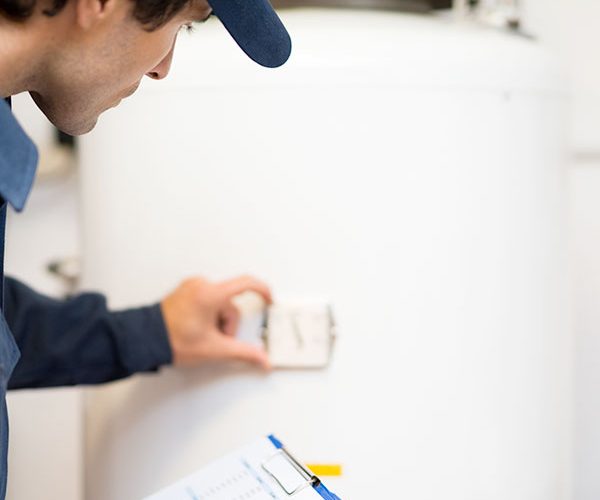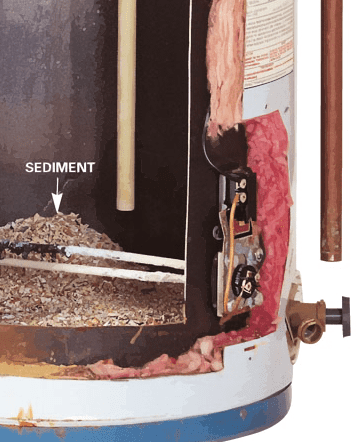We have come across this post involving Common Hot Water Heater Problems directly below on the net and accepted it made good sense to share it with you over here.

A water heater is among one of the most essential fundamental devices that can be found in a house. With hot water heater, you do not need to undergo the stress of home heating water manually every time there is a need to take a bath, do the laundry, or the dishes. There is always a possibility that your water heater would certainly act up as with a lot of mechanical gadgets.
It is essential to note any little breakdown and tackle it quickly before things leave hand. A lot of times, your hot water heater begins to malfunction when there is an accumulation of sediments as a result of continuous use. As a preventative measure, periodic flushing of your water heater is recommended to prevent debris accumulation and stop useful failing.
Usual hot water heater emergency situations and also how to manage them
Too little warm water
It might be that the water heating unit can't sustain the hot water demand for your apartment or condo. You can upgrade your water heating unit to one with a larger capacity.
Rising and fall water temperature.
Your water heater might begin creating water of various temperature levels typically ice hot or cold hot. In this circumstance, the first thing you do is to ensure that the temperature is set to the preferred degree. If after doing this, the water temperature level maintains changing during showers or other activities, you might have a malfunctioning thermostat. There could be a demand to change either the home heating or the thermostat system of your hot water heater.
Dripping hot water heater storage tank.
A leaking storage tank could be an indication of rust. It can create damage to the flooring, wall as well as electrical devices around it. You could also go to risk of having your apartment or condo swamped. In this scenario, you need to turn off your water heater, permit it to cool off, and carefully look for the resource of the trouble. At times, all you need to do is to tighten up a few screws or pipeline links in cases of minor leakages. But if this does not work as well as the leak persists, you may need to use the solutions of a service technician for an appropriate substitute.
Stained or odiferous water
When this takes place, you need to recognize if the problem is from the tank or the water source. If there is no funny scent when you run cold water, then you are specific that it is your hot water heater that is faulty. The odiferous water can be caused by rust or the accumulation of bacteria or debris in the hot water heater container. You can attempt flushing out your tank or changing the anode if the trouble lingers as soon as you notice this. The feature of the anode is to clean microorganisms from your container. Since the anode pole replacement needs a thorough understanding of your water heater, you will certainly need the assistance of a specialist.
Conclusion
Some home owners disregard little warning and minor faults in their hot water heater device. This only leads to further damages and a possible complete failure of your home appliance. You should take care of your water heater mistakes as soon as they come near prevent more expenditures and unneeded emergency difficulties.
With water heaters, you do not need to go via the tension of heating water by hand every time there is a demand to take a bathroom, do the washing, or the dishes. It may be that the water heating system can not support the warm water demand for your apartment. Your water heater can start producing water of various temperatures generally ice hot or cold hot. If there is no funny smell when you run chilly water, then you are specific that it is your water heating system that is faulty. The stinky water can be created by rust or the accumulation of bacteria or sediments in the water heating unit storage tank.
9 COMMON CAUSES OF WATER HEATER LEAKS
Why Is My Hot Water Heater Leaking?
Old Water Tank
Just like with any other household appliance, water tanks wear down as they age. Older water tanks are more susceptible to leaks and lower water retention. Generally, a leaking water tank results from rust buildup that causes internal corrosion. As the inside of the tank corrodes, cracks form that allow water to escape. You can patch the cracks to buy some time, but this is only a temporary fix. Eventually, you’ll need a new unit.
Drain Valve
You can use the drain valve on your water heater to empty and clean the tank. This component can become loose as it encounters continuous usage throughout the years. If your hot water heater is leaking, the source of the issue may be a loose drain valve. You may notice a mild water leak due to small openings that weren’t there before. Sometimes a simple tightening will do the trick, but if the valve is loose at the base, you will need to replace it.
High Pressure
Your water heater will naturally create pressure as it increases the water’s temperature. But too much pressure can cause problems. If excess pressure can’t escape the unit properly, water starts to leak through any cracks that are present.
Malfunctioning Temperature & Pressure Relief Valve
The problem above may result from a malfunctioning pressure relief valve. When the internal pressure of your water tank gets too high, the pressure relief valve allows steam to escape the unit and return to a stable temperature. Sometimes the valve just gets loose and needs to be tightened, but if it’s broken, you need to replace it with a new one.
Inlet & Outlet Connections
During the heating process, cold water comes into the tank through the inlet connection, and hot water exits through the outlet connection to travel through the pipes in your home. As with drain and pressure relief valves, these connections can loosen over time and cause a water heater leak. If this happens, either try to tighten the connections yourself or call a professional plumber.
Tank Interior
Water heaters have two “shells,” an internal shell that contains the water and an external shell that insulates the internal shell. While water leaks coming from the external shell are easy to spot because it’s just covered by a thin metal layer, they’re harder to catch in the internal shell because it’s covered by two layers of material.
Collection of Sediment
Here’s why regular water heater maintenance is so important. If you neglect cleaning the tank, sediment builds up at the bottom and eventually causes the unit to crack. The formation of cracks in the tank can cause a mild to severe water heater leak in your home. If the tank starts leaking, all you can do is replace it entirely. So do yourself a favor and clean the tank a few times a year to prevent this from happening. Your wallet will thank you later.
https://www.horizonservices.com/about-us/blog/9-common-causes-of-water-heater-leaks/

I came across that piece of writing on Common Hot Water Heater Problems when surfing around the internet. For those who enjoyed reading our blog post if you please be sure to pass it around. Thanks a lot for going through it.
Expert diagnostics offered.